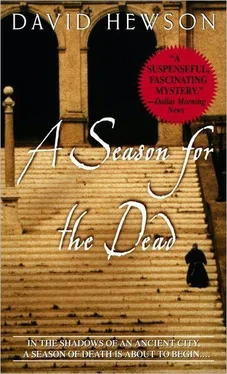David Hewson - A Season for the Dead
Здесь есть возможность читать онлайн «David Hewson - A Season for the Dead» весь текст электронной книги совершенно бесплатно (целиком полную версию без сокращений). В некоторых случаях можно слушать аудио, скачать через торрент в формате fb2 и присутствует краткое содержание. Жанр: Старинная литература, на английском языке. Описание произведения, (предисловие) а так же отзывы посетителей доступны на портале библиотеки ЛибКат.
- Название:A Season for the Dead
- Автор:
- Жанр:
- Год:неизвестен
- ISBN:нет данных
- Рейтинг книги:3 / 5. Голосов: 1
-
Избранное:Добавить в избранное
- Отзывы:
-
Ваша оценка:
- 60
- 1
- 2
- 3
- 4
- 5
A Season for the Dead: краткое содержание, описание и аннотация
Предлагаем к чтению аннотацию, описание, краткое содержание или предисловие (зависит от того, что написал сам автор книги «A Season for the Dead»). Если вы не нашли необходимую информацию о книге — напишите в комментариях, мы постараемся отыскать её.
A Season for the Dead — читать онлайн бесплатно полную книгу (весь текст) целиком
Ниже представлен текст книги, разбитый по страницам. Система сохранения места последней прочитанной страницы, позволяет с удобством читать онлайн бесплатно книгу «A Season for the Dead», без необходимости каждый раз заново искать на чём Вы остановились. Поставьте закладку, и сможете в любой момент перейти на страницу, на которой закончили чтение.
Интервал:
Закладка:
On occasion God could appear cruel. There would be times when no one would comprehend His meaning. The innocent would suffer, perhaps more than the wicked. There would be pain where it was undeserved, grief which could appear so great it was impossible to believe one would ever escape its morbid clutches.
One would ask—and this was quite normal, Sister Annette said, this happened to everyone—whether a loving God could allow such things to happen at all. This was the Devil talking, whispering in our ears at the moment of our greatest weakness. God’s grace, though sometimes incomprehensible, was there to make us free. We made our own prisons.
We—not He—sent ourselves to Hell. He loved us through our agonies and would, in the end, redeem us with His kindness. Once we had walked the path toward Him. Once we had found our own particular path to Paradise.
Life was a mystery, the nun said, a gift. And like all gifts it could be taken away. When that moment happened, the faithful didn’t complain. They thanked God that the gift was there at all. They acceded to His greater wisdom. They loved Him all the more and found, in that love, solace.
Sara had looked up into the sharp blue eyes, struggling to understand.
She adored this woman with all her heart. For as long as Sara had been in the school—and that predated even the haziest of distant memories—Sister Annette had been like a parent. Her own mother and father were infrequent visitors, tall, stern figures, not staying long when they did arrive. They were busy people.
When they came they would kiss her on the cheek, leave endless gifts and promises. Sara felt fortunate they had the time to come at all. Sister Annette had agreed on this point too, and Sara knew she would never lie. This was not an absence of affection on their part. They lived in a different world, one where a quiet five-year-old child who spoke so little, who spent her time in daydreams she never revealed to another living soul, would never be happy. They did this for her own good and she would one day be grateful.
“God works constantly,” the sister said, “beyond our understanding.”
She hesitated. There was, the child thought, something wrong with her.
A cold. Flu perhaps. Sister Annette was ill and the thought made Sara clasp the nun’s hand to the Bible all the more tightly. It was impossible for the child to imagine a world without this woman in it.
“Sara,” the nun said finally. “God has taken your mother and your father to Him. Yesterday. In America. There was an accident.”
Sara recalled—would always recall—how this made her mouth go dry, made something hard and painful begin to grow in her throat, like a cancer coming from nowhere.
“They live with God now. They’re in His Heaven, where you’ll see them one day too, provided you are a good girl, as you are now. God loves you, Sara. We all love you. We will love you every day till He calls us to go to Him too and we’ll wait for you patiently there until we’re reunited. Your parents. All of us.”
Sister Annette paused again. Her eyes were glassy. “There’s nothing for you to worry about,” she said in a voice that abruptly took a practical tone. “We’ll look after you, forever if you like. You can go out into the world too if you choose. You’ll have the means to do whatever you want.”
At this point the nun hugged her. Sara could still remember the smell. The stink of death sat upon her, an old, dry stink, like something going bad. Within the year, Annette would join God in Heaven. She would become part of the great procession to His door, willingly, smiling perhaps, as she died.
“Be sad,” Sister Annette said. “But be happy and wise too. And be grateful. You’ve much to be grateful for.”
“I will,” the child answered, wondering if she had the courage to make good her promise.
The sister smiled. “I know you will. You’re a good girl, my little Sara. You always will be. And one day—on this earth—you’ll be rewarded. One day you’ll know some great joy in your life.”
Those last words were so fixed in Sara’s memory, she was convinced they were accurate, the very ones Sister Annette had used. Yet there was another memory too, an inexplicable flaw in the picture: that as the nun spoke there were tears, thick and salty, running down her cheeks, so slowly, so ponderously, she resembled the pale, static figure of the Virgin Mary in the chapel whose face was stained with drops that were mother of pearl, not human at all.
Sara Farnese glanced at her watch and wondered at the power of these memories. Sometimes they stood in the way of the present, she thought, easy crutches on which to lean as a substitute for decision and action. What would Sister Annette make of her present existence? Sara knew the answer and did not wish to dwell on it.
It was now 2:27 and the press were still making a noise beyond the windows. She was sick of the notes being pushed through the door of the apartment block. She had taken the phone off the hook. Still they waited. Still they haunted her.
She put on a pair of sunglasses and walked to the window. Outside, in the narrow lane, cameras flashed, voices rose, TV crews scrambled to take advantage of this rare appearance by the woman they all wanted to see. A woman the media was already painting as some kind of black temptress, the guilty party to an affair in which one lover—a married one at that—murdered his wife and his ex-mistress’s new lover in the most bloody of fashions.
People walking down the main road hesitated, stopping to stare at this commotion in the shadow of the Pope’s thoroughfare. Would they be any more forgiving? Would they even wish to understand? Sara doubted it. The best she could hope for from the masses was a lack of interest, which was unrealistic given the curiosity the media was creating in the story.
At 2:29, Sara Farnese walked into her bedroom and unlocked a compartment in the small bedside cabinet. The phone still bore the sticker from the mobile operator in Monaco. Calls made using it were, he’d said, untraceable, unlike those from Italian models. He had one too. If they just used the pair of mobiles, at times they agreed upon beforehand, everything would be fine. No one need ever know.
She turned on the handset, waited and, sure enough, at half past it rang.
He wasn’t angry with her, not this time. Sara Farnese felt grateful to hear his voice, which was full of warmth and reassurance, telling her everything would be fine, just to keep calm, keep quiet and never say more than was necessary, particularly to the police.
She cried a little. It was impossible to halt the tears. She told him too about the noisy animals on her doorstep and the way the thought of them kept invading her head.
“I’ll send you a gift,” he said.
They spoke for no more than four minutes, four minutes in which she felt herself restored to the world, one which Sister Annette would have recognized, even if the old nun found parts of it questionable.
Just after three Sara walked tentatively to the window, standing far enough back to be able to see without being seen. The street-cleaning vans had arrived in the Borgo Pio, a day before schedule, even though the place was still free of litter, thanks to the cruel August weather which was chasing people from the city. Two vans were working their way along the road, spraying water everywhere, big circular brushes turning from beneath their bellies. Then they turned into Vicolo delle Palline, a place no cleaning truck had ever visited before, and made straight for the crowd beneath the window. The media mob scattered, clutching their cameras, cursing as the vehicles ploughed remorselessly through their midst.
Sara Farnese watched from behind the curtain and wished she could laugh. There had been more generous gifts but none so welcome or well timed. Nevertheless, this unwanted attention would return.
Читать дальшеИнтервал:
Закладка:
Похожие книги на «A Season for the Dead»
Представляем Вашему вниманию похожие книги на «A Season for the Dead» списком для выбора. Мы отобрали схожую по названию и смыслу литературу в надежде предоставить читателям больше вариантов отыскать новые, интересные, ещё непрочитанные произведения.
Обсуждение, отзывы о книге «A Season for the Dead» и просто собственные мнения читателей. Оставьте ваши комментарии, напишите, что Вы думаете о произведении, его смысле или главных героях. Укажите что конкретно понравилось, а что нет, и почему Вы так считаете.












